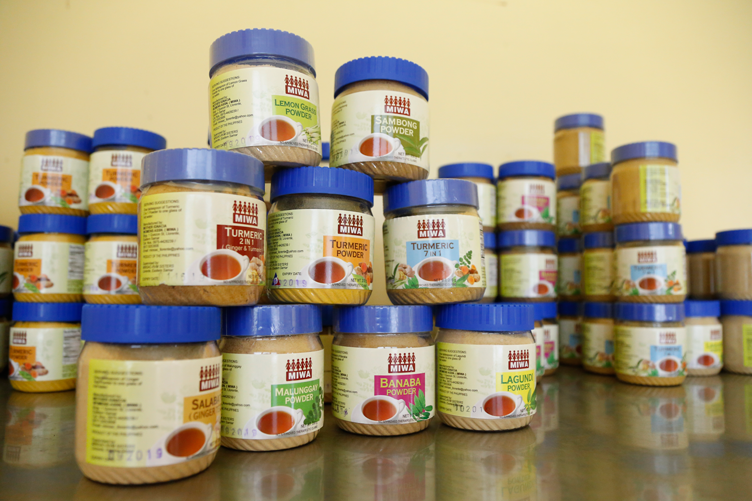Tea perks up a community
A tea production enterprise is empowering the women of Llorente, Eastern Samar by giving them a decent source of income.
Dubbed as Mother Ignacia Women’s Association (MIWA), the group has been instrumental in improving the lives of its members since the initial set of teas were produced in 2006.
Planting the Roots
It all started when Narcisa ‘Nars’ Sayson shared her knowledge on herbal tea processing with the mothers of the weekly Family Enrichment Workshop conducted by the Religious of the Virgin Mary (RVM) sisters at Mother Ignacia Village.
Mother Ignacia Village is a refuge for families who do not have their own homes and stable source of livelihood–some due to extreme poverty while the others were victims of natural calamities. It is managed by the Mother Ignacia National Apostolic Center (MINSAC), a non-government, faith-based organization aiming to build communities and social structures that foster harmony in diversity, through the RVM sisters.
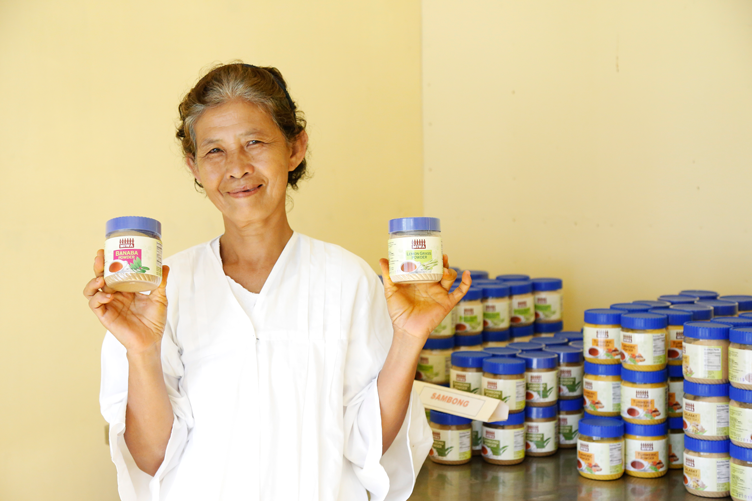
The training on herbal tea processing was in line with the aim of RVM sisters to help build stronger communities. After seeing the potential of the herbal tea processing enterprise as a source of income for housewives in the village, RVM sisters decided to form the
Mother Ignacia Women’s Organization (MIWO). The group started with 16 mothers, including Nars, and worked on their first produce of salabat. Each of the members pitched in Php20 as initial capital. They tried the tea themselves before introducing it to the market.
Eventually, they started selling powdered herbal teas in small plastic bags (the ones commonly used for ice candy) and sold it for Php5 and Php10 around their barangay. After gaining enough interest among their neighbors, they decided to produce more in empty peanut butter canisters.
Their first products included herbal teas from ginger (salabat), sambong, banaba, and malunggay, among others. They manually processed the raw materials using cloth sacks for squeezing and mortar and pestle for grinding. They used to bring these products to nearby communities, especially during events, even without any sure buyers.
During that time, the mothers were already content with what they are earning. But the RVM sisters supporting them knew that MIWO can do a lot better.
Growing the plant
After more than five years of merely selling their products to nearby communities, MIWO decided to register their group as a livelihood association in the Department of Labor and Employment (DOLE) and as a business in the Department of Trade and Industry (DTI). They changed their name to Mother Ignacia Women’s Association (MIWA), which seemed to be the starting point of their exponential success.
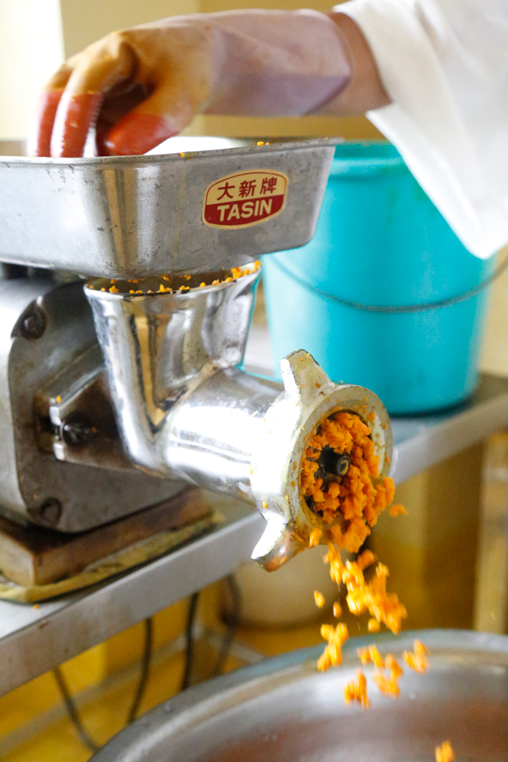
“We were actually content that we were earning unlike before. They (RVM sisters) encouraged us to register our business, which is necessary if we want to develop it further,” shared MIWA President Ester Cuntado.
Through DTI, they were encouraged to add turmeric tea in their line of products. That is when people started to know about their organization. And as more people get to taste their teas, they had to scale up their production.
MIWA initially received two units of pulverizer, one four-burner gas stove, and five stainless tables from DTI through the Shared Service Facilities (SSF) program. Recently, a spray dryer was also granted to them. According to MIWA members, the facility helped them increase their production and decrease working time. Before, each member had to work eight hours a day to process 30 kilograms of turmeric to produce 20 canisters of herbal tea. When they got the additional equipment, MIWA members are now able to process 130 kilograms of turmeric daily to come up with 130 canisters of tea. Each member is required to work for only four hours a day.
They also received product development assistance from the Negosyo Center, helping them improve their packaging and labeling. Through DTI trainings and seminars, MIWA members also learned the fundamentals of managing a business. Meanwhile, by participating in trade fairs organized by the Department, they were able to widen their market access.
“Without DTI’s help, we may not have prospered. DTI has been helping us improve and expand our business up until now,” Nars said. She added, “We really are grateful to DTI for their support through these years. If not for DTI, we would not develop into a stable enterprise,” Ester shared.
At present, their product line already includes banaba, sambong, malunggay, lemongrass, salabat, lagundi, and turmeric herbal teas, as well as combination variants such as the seven-in-one and five-in-one teas.
They no longer have to bring their products to different areas, without any certainty that they would go home with profits. Now, they are already supplying in various outlets like supermarkets, pasalubong centers, and airports.
Using their association’s own earnings, they were also able to have the former day care center of the village renovated to be their own production facility, which houses the set of equipment provided by DTI.
Furthermore, the now 32 members of the association are earning at least P240 daily, working only three hours per day, giving them enough time to still take care of their families.
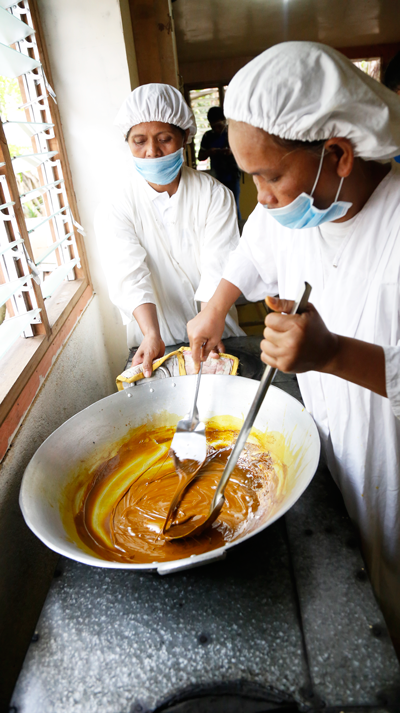
“These herbal products really helped us a lot. We were plain housewives who did not have any source of income help our husbands who work as farmers, fishermen, and pedicab drivers. Now, we are able to augment our household income and provide for the needs of our children,” Nars shared.
After over a decade, the mothers also recognize that the impact of this livelihood to their lives is not just economic. Above everything, they said, it uplifted their dignities.
“Some of our members had low self-esteem before the business started. But they can now speak confidently during trade fairs and seminars. This venture has indeed empowered our women members,” Nars said.
MIWA was actually awarded as the Outstanding SSF for Region 8 in 2017 – a proof that its members have significantly improved since they started.
Secrets for growth
Aside from the assistance MIWA received from government agencies like DTI and non-government organizations such as MINSAC, they also attribute the success of the association to the values they uphold.
Members believe that their faith and camaraderie help them survive any kind of hurdle.
“In any organization, disagreements are normal. But we always make sure we solve each problem since we’re a family,” Ester said.
Members of the association also exhibit unrelenting perseverance to enhance their status in life.
“We always remind each other to continue to persevere. We should not just rely on the government. We need to help ourselves,” Nars stressed.
Lastly, their commitment to high quality is surely one of the secret ingredients to success. From the delivery of the raw materials up to packaging, they adhere to quality thereby ensuring continuous patronage of products. They value feedback from the customers and use it to further develop their products.
Empowering others
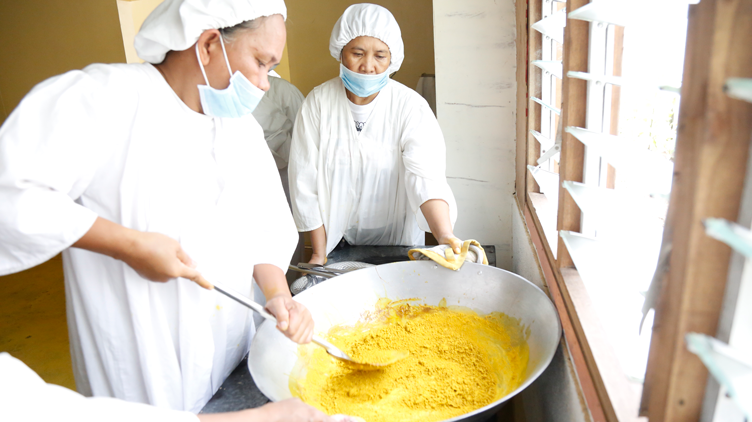
The mothers believe that they have not reached their peak yet. They know in their hearts that in time, association will reach its full potential. They are still striving to complete the renovation of their production facility with dreams of having a bigger one. They are likewise preparing for the Food and Drug Administration (FDA) accreditation to increase credibility and reliability of their products with the aim of expanding their product reach to the overseas market.
But as their continuously strive for those goals, they are committed to share learnings to others, particularly to smallholder farmers in Llorente and nearby towns.
Aside from some materials that they grow by themselves, MIWA buys the majority of its raw materials from various farmer organizations from nearby municipalities. Since they require almost six sacks of each plant daily, they are helping several farmers—both individuals and groups.
MIWA actually has enough space and manpower to grow their raw materials, yet they prefer to source it from these farmers. When asked why, Ester said, “It’s our way of helping them. If our lives would improve, theirs should improve as well.”
These mothers are persevering to uplift the lives, not only of their respective families, but also of the members of the other sectors in their area. There is indeed a brighter future ahead not only for MIWA, but for Llorente as a municipality.
MIWA’s story is not just a picture of empowered mothers; it is the story of empowered women, spreading empowerment across their community as well.
